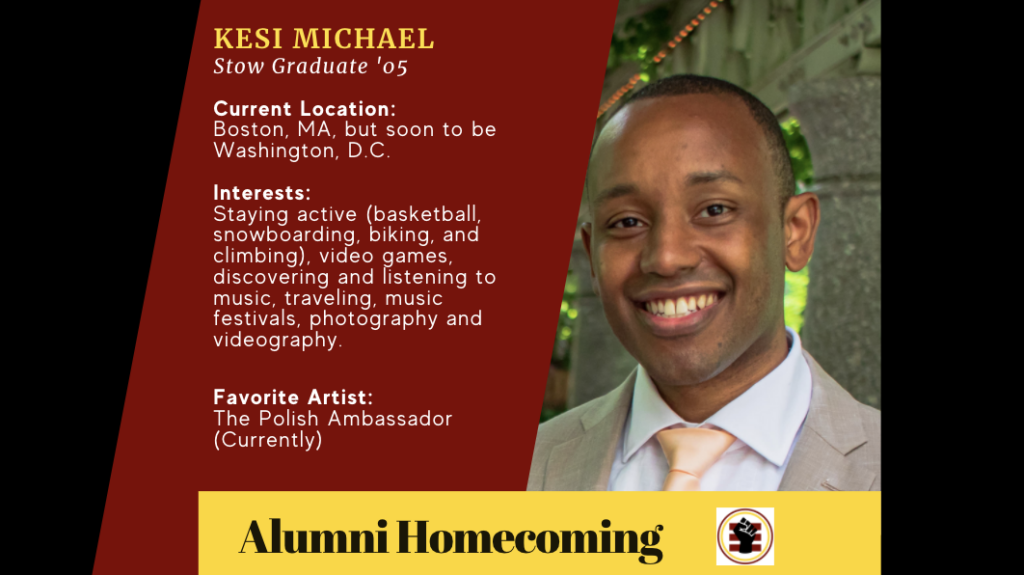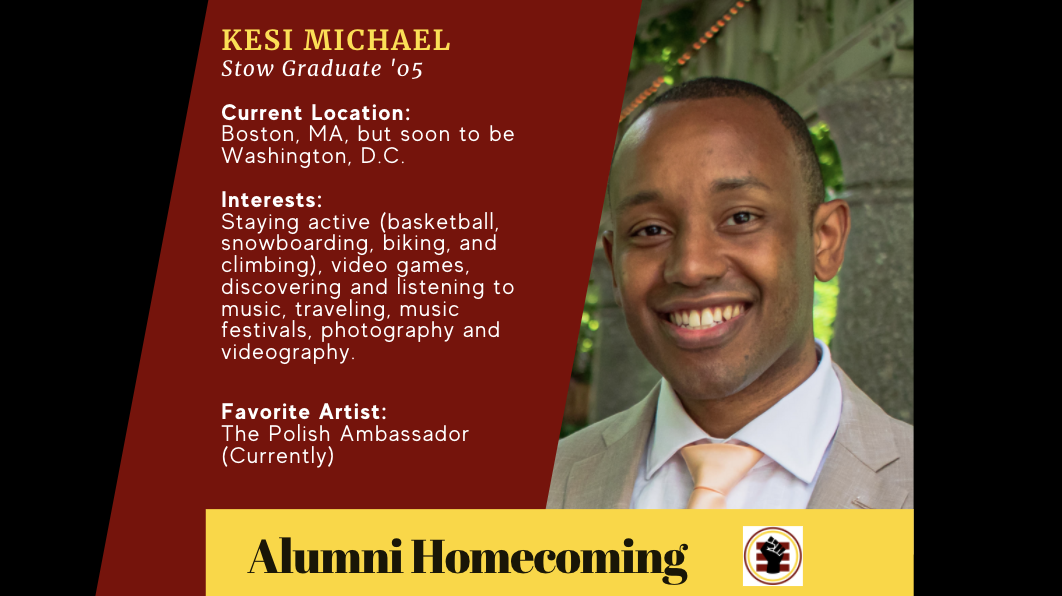
The Stow Collaboration for Change is excited to introduce Kesi Michael, SMFHS Class of 2005, for the first installment of our Homecoming series! Each Homecoming is an interview with a Stow alumni of color. We learn about what they’re up to, what they’re proud of, and how they experienced the Stow-Munroe Falls school district as a BIPOC student.
Interested in being featured? Reach out: hello@sc4c.org.
Where’s your current home base? What do you love about where you live?
Boston, MA, but soon to be Washington, D.C. As much as I love to hate on Boston, I do love the great food options from many different backgrounds. Yes, they do have more than lobster rolls and clam chowder!
What’s something you’re proud of that happened after high school?
I am proud of becoming the person I am today—one that is continually growing in wisdom, empathy, and love.
Can you share some of the most important lessons you’ve learned since graduating?
I think the most important lesson I have learned is really a series of lessons about the spectrum of humanity. It’s been about learning and understanding that individuals don’t fit into categories or labels and instead are somewhere on a long line of personality traits, ideologies, perspectives, physical characteristics, preferences, etc.
What do you like to do for fun?
I enjoy staying active (basketball, ultimate, snowboarding, biking, and climbing). I also like video games—currently playing Civ 6: Gathering Storm and a little World of Warcraft—discovering and listening to music, traveling, music festivals, photography and videography.
What’s your favorite…
• Food? BBQ Ribs
• Drink? Water
• Artist? Most recently, The Polish Ambassador
• Local restaurant or bar? Dakzen
Can you share your thoughts on the demonstrations for racial justice of summer 2020?
I think it was a really powerful moment for the U.S. and many countries around the world. I think it has sparked a very necessary awakening and realization for many, but I think we in the U.S. have an incredibly long way to go before race becomes an inconsequential aspect of our society.
We grew up learning about the Civil Rights movement at school as if it had been concluded, but for me, my family, and the communities of color that I am a part of, these are issues that we have continued to discuss for as long as I can remember. The demonstrations sparked a lot of great questions and conversations both professionally and personally, so I’ve had to look at this from many different lenses as a supervisor of both white people and people of color, as a person of color myself, as an immigrant, and as someone who grew up in predominantly-white suburban Ohio.
I’ve tried really hard to understand the perspective of individuals on all sides of this issue who have varying degrees of exposure to race and race-related issues. Ultimately, I’ve come to a few conclusions that I hope others can agree with:
1. Life isn’t fair, but we can design a government, with its many functions and facets, that is as close to fair as possible.
2. We know that inequalities currently exist, whether they are historical, geographical, socioeconomic, or other.
3. We as a society can work toward countering those inequalities by treating all people with the privilege and opportunities that only some enjoy.
What do you wish someone had told you in high school, especially as a student of color?
Honestly, I wish someone would have just told me that it’s ok to be me, and not some version of Black that others expected or asked me to be.
What do you wish your classmates had known about your experience as a student of color? Your teachers?
Code switching is a term I think many people have become more aware of recently, and I think everyone does it to some extent: changing one’s language to fit the social setting. My experience was one of a constant outsider, which meant a lot of code switching—but I had to code switch every aspect of myself in order to, what felt like, survive.
I learned pretty quickly to navigate most social situations to avoid bullying or drawing unwanted attention, but never felt like I had a group that I was really a part of.
What was your experience of racism in Stow schools?
I’ll just say that it was a near constant presence from the time I entered Stow schools in 2nd grade. I was physically assaulted and verbally harassed and the jokes were so constant that I started preempting them just to get them out of the way. Most of the time it accomplished its goal, and made me ashamed of who I was, but I always put a smile on to prove to myself that it wouldn’t break me.
What are your thoughts on how Stow can best address racism in its schools?
First and foremost, Stow, as with all institutions, should be taking a hard look at all their policies and procedures that could be unknowingly disenfranchising students of color. I think the most important counter to racism is exposure. When we normalize different races, cultures, backgrounds, and experiences, they become familiar and we eliminate the desire to treat others differently. As a school, Stow has a responsibility to seriously assess their curriculum and address racism directly as well as indirectly by weaving anti-racism into the curriculum.
Normalizing the stories and contributions of people of color, confronting our countries mistakes, and instilling values of empathy and compassion are a good first step.
Anything else you’d like to share?
There was a lot of good at Stow. I had so many wonderful, kind, and supportive educators and I have an immense amount of gratitude for the education, opportunities, and experiences I received. Growing up was hard, especially high school, as I’m sure it was for a lot of people, but I am thankful for the opportunity I was awarded, despite all of the hardships.
Are you a Stow alumni of color who would like to share your story? Get in touch! hello@sc4c.org

